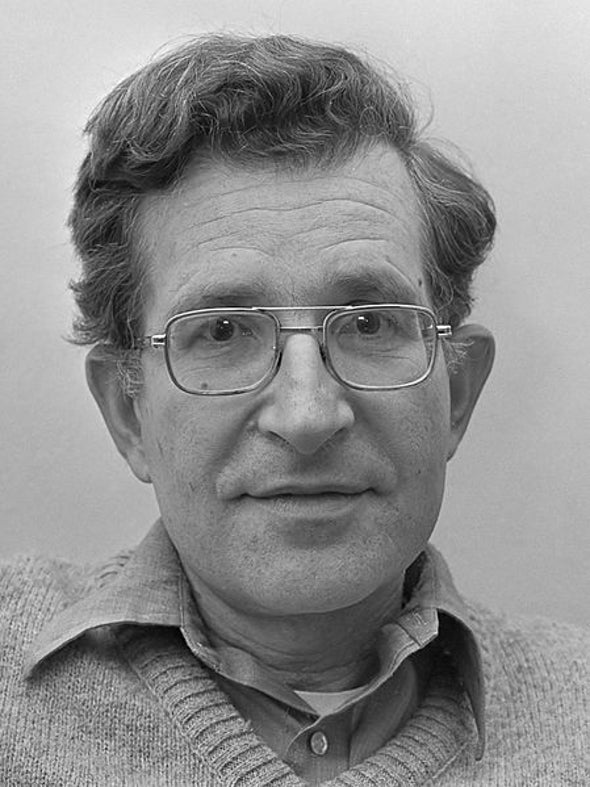by JOHN HORGAN
 In a 1990 interview, Noam Chomsky (shown here in 1977), contended that modern science has stretched humans’ cognitive capacity to the breaking point. In the 19th century, any well-educated person could grasp contemporary physics, but now “you’ve got to be some kind of freak.” Chomsky rejected the possibility that physicists can attain a “theory of everything.” At best, physicists can create only a “theory of what they know how to formulate.” PHOTO/Hans Peters Anefo, Nationaal Archief/CC BY 4.0
In a 1990 interview, Noam Chomsky (shown here in 1977), contended that modern science has stretched humans’ cognitive capacity to the breaking point. In the 19th century, any well-educated person could grasp contemporary physics, but now “you’ve got to be some kind of freak.” Chomsky rejected the possibility that physicists can attain a “theory of everything.” At best, physicists can create only a “theory of what they know how to formulate.” PHOTO/Hans Peters Anefo, Nationaal Archief/CC BY 4.0
In a 1990 interview the renowned iconoclast knocked The New York Times, evolutionary psychology, human cognitive capacities and his own talent as a linguist
For a guy who turns 88 this month, Noam Chomsky, the linguist and social critic, really gets around. Chomsky “remains a vital presence in American intellectual life,” The New York Times remarks in a recent Q&A. After reading Chomsky’s comments on the victory of Trump and the Republican Party (“the most dangerous organization in world history),” I watched the film Captain Fantastic, whose hero celebrates Chomsky’s birthday. I also wrote on this blog about flare-ups of the ancient debate over Chomsky’s language theory. (Actually, psychologist Steven Pinker wrote most of the column.) The brouhaha got me reminiscing about a day I spent with Chomsky in 1990, when we talked about, among other things, the limits of science. Below is a profile of Chomsky based on our 1990 meeting (and subsequent phone calls) and adapted from The End of Science. I’ve highlighted passages I find especially noteworthy. –John Horgan
In 1990, after traveling to Cambridge to interview Noam Chomsky, I watched him give a talk on organized labor. He was wiry, with the slight hunch of a chronic reader. He wore steel-rimmed glasses, sneakers and an open-necked shirt. But for the lines in his face and the grey in his longish hair, he could have passed for a graduate student.
Chomsky’s main message was that labor-union leaders care about maintaining power more than representing workers. His audience? Union leaders. During the Q&A they reacted, predictably, with irritation. But Chomsky replied with such serene, unshakable conviction–and such a relentless barrage of facts–that before long the audience was nodding in agreement: yes, perhaps they were selling out to their corporate overlords.
After we returned to Chomsky’s office at MIT, I expressed surprise at the harshness of his criticism. He replied that he doesn’t believe in giving people with power “A’s for being right.” Of course, labor unions are losing their clout, so he usually dwells on the faults of the U.S. government, corporations and media. Chomsky called the U.S. a “terrorist superpower” and the media its “propaganda agent.” If The New York Times started reviewing his books on politics, he would know he’s doing something wrong. He summed up his worldview as “whatever the establishment is, I’m against it.”
It’s ironic, I said, that his political views are so anti-establishment, given that in linguistics he is the establishment. “No I’m not,” he snapped. His voice, which ordinarily is hypnotically calm–even when he is eviscerating someone–had an edge. “My position in linguistics is a minority position, and it always has been.” He insisted that he is “almost totally incapable of learning languages.” MIT hired him and gave him tenure because it does not care much about the humanities; it simply needed to fill a slot.
I mention this exchange for its cautionary value. Chomsky is one of the most contrarian intellectuals I have met (rivaled only by philosopher Paul Feyerabend). He is compelled to criticize all authority figures, even himself. Chomsky is, notwithstanding his denials, the most important linguist who has ever lived. “There is no major theoretical issue in linguistics today that is debated in terms other than those in which he has chosen to define it,” Encyclopedia Britannica declares.
Scientific American for more
